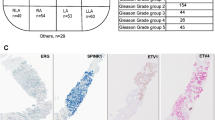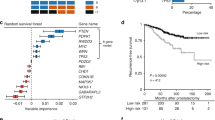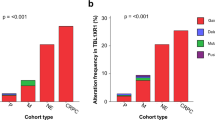Abstract
Prostate-specific antigen (PSA) screening has led to a remarkable increase in prostate cancer cases undergoing operative therapy. Over half of patients with locally advanced cancer (≧pT3) develop rising PSA levels (biochemical failure) within 10 years. It is very difficult to predict which patients will progress rapidly to advanced disease following biochemical failure (BF). Therefore, a more useful prognostic factor is needed to suggest the most appropriate therapies for each patient. To determine chromosomal aberrations, we examined 30 patients with stage pT2 or pT3 primary prostate adenocarcinomas and no metastases (pN0M0) by comparative genomic hybridization (CGH). Laser capture microdissection (LCM) was used to gather cancer cells from frozen prostate specimens. Common chromosomal alterations included losses on 2q23–24, 4q26–28, 6q14–22, 8p12–22 and 13q21–31, as well as gains on 1p32–36, 6p21 and 17q21–22. Losses at 8p12–22 and 13q21–31 were observed more frequently in pT3 than pT2 tumors (P<0.05 and P<0.01, respectively). Losses at 8p12–22 were more frequent in tumors with BF (P<0.05), and those at 13q12–21 were more frequent in tumors with Gleason score (GS) 7 or more than lower GS (P<0.05). These findings suggest that losses of 8p12–22 and 13q21–31 are important determinants of prostate cancer progression.
This is a preview of subscription content, access via your institution
Access options
Subscribe to this journal
Receive 4 print issues and online access
$259.00 per year
only $64.75 per issue
Buy this article
- Purchase on Springer Link
- Instant access to full article PDF
Prices may be subject to local taxes which are calculated during checkout


Similar content being viewed by others
References
Dijkman GA, Debruyne FM . Epidemiology of prostate cancer. Eur Urol 1996; 30: 281–295.
Hull GW, Rabbani F, Abbas F, Wheeler TM, Kattan MW, Scardino PT . Cancer control with radical prostatectomy alone in 1000 consecutive patients. J Urol 2002; 167: 528–534.
Mattfeldt T, Kestler HA, Hautmann R, Gottfried HW . Prediction of prostatic cancer progression after radical prostatectomy using artificial neural networks: a feasibility study. BJU Int 1999; 84: 316–323.
Ichikawa T, Suzuki H, Ito H . Role of chromosomal loss in the progression of prostate cancers. Int J Clin Oncol 2000; 5: 345–354.
Struski S, Doco-Fenzy M, Cornillet-Lefebvre P . Compilation of published comparative genomic hybridization studies. Cancer Genet Cytogenet 2002; 135: 63–90.
Ribeiro FR, Diep CB, Jerónimo C, Henrique R, Lopes C, Eknæs M et al. Statistical discussion of genetic pathways involved in prostate carcinogenesis. Genes Chromosomes Cancer 2006; 45: 154–163.
Suzuki H, Emi M, Komiya A, Fujiwara Y, Yatani R, Nakamura Y et al. Localization of a tumor suppressor gene associated with progression of human prostate cancer within a 1.2 Mb region of 8p22-p21.3. Genes Chromosomes Cancer 1995; 13: 168–174.
Suzuki H, Komiya A, Emi M, Kuramochi H, Shiraishi T, Yatani R et al. Three distinct commonly deleted regions of chromosome arm 16q in human primary and metastatic prostate cancers. Genes Chromosomes Cancer 1996; 17: 225–233.
Komiya A, Suzuki H, Ueda T, Yatani R, Emi M, Ito H et al. Allelic losses at loci on chromosome 10 are associated with metastasis and progression of human prostate cancer. Genes Chromosomes Cancer 1996; 17: 245–253.
Komiya A, Suzuki H, Ueda T, Aida S, Ito N, Shiraishi T et al. PRLTS gene alterations in human prostate cancer. Jpn J Cancer Res 1997; 88: 389–393.
Kawana Y, Komiya A, Ueda T, Nihei N, Kuramochi H, Suzuki H et al. Location of KAI1 on the short arm of human chromosome 11 and frequency of allelic loss in advanced human prostate cancer. Prostate 1997; 32: 205–213.
Kawana Y, Ichikawa T, Suzuki H, Ueda T, Komiya A, Ichikawa Y et al. Loss of heterozygosity at 7q31.1 and 12p13–12 in advanced prostate cancer. Prostate 2002; 53: 60–64.
Ueda T, Komiya A, Emi M, Suzuki H, Shiraishi T, Yatani R et al. Allelic losses on 18q21 are associated with progression and metastasis in human prostate cancer. Genes Chromosomes Cancer 1997; 20: 140–147.
Ueda T, Emi M, Suzuki H, Komiya A, Akakura K, Ichikawa T et al. Identification of a I-cM region of common deletion on 13q14 associated with human prostate cancer. Genes Chromosomes Cancer 1999; 24: 183–190.
Ueda T, Komiya A, Suzuki H, Shimbo M, Sakamoto S, Imamoto T et al. Loss of heterozygosity on chromosome 2 in Japanese patients with prostate cancer. Prostate 2005; 64: 265–271.
Heilporn-Pohl V, Brachet J . Net DNA synthesis in anucleate fragments of Acetabularia mediterranea. Biochim Biophys Acta 1966; 119: 429–431.
Cavalli IJ, Mattevi MS, Erdtmann B, Sbalqueiro IJ, Maia NA . Equivalence of the total constitutive heterochromatin content by an interchromosomal compensation in the C band sizes of chromosomes 1, 9, 16, and Y in Caucasian and Japanese individuals. Hum Hered 1985; 35: 379–387.
Kallioniemi A, Kallioniemi OP, Sudar D, Rutovitz D, Gray JW, Waldman F et al. Comparative genomic hybridization for molecular cytogenetic analysis of solid tumors. Science 1992; 258: 818–821.
Sun J, Liu W, Adams TS, Sun J, Li X, Turner AR et al. DNA copy number alterations in prostate cancers: a combined analysis of published CGH studies. The Prostate 2007; 67: 692–700.
Isola J, DeVries S, Chu L, Ghazvini S, Waldman F . Analysis of changes in DNA sequence copy number by comparative genomic hybridization in archival paraffin-embedded tumor samples. Am J Pathol 1994; 145: 1301–1308.
Mckie AB, Douglas DA, Olijslagers S, Graham J, Omar MM, Heer R et al. Epigenetic inactivation of the human sprouty2 (hSPRY2) homologue prostate cancer. Oncogene 2005; 24: 2166–2174.
Bookstein R, Bova GS, MacGrogan D, Levy A, Isaacs WB . Tumour-suppressor genes in prostatic oncogenesis: a positional approach. Br J Urol 1997; 79: 28–36.
MacGrogan D, Levy A, Bova GS, Isaacs WB, Bookstein R . Structure and methylation-associated silencing of a gene within a homozygously deleted region of human chromosome band 8p22. Genomics 1996; 35: 55–65.
He WW, Sciavolino PJ, Wing J, Augustus M, Hudson P, Meissner PS et al. A novel human prostate-specific, androgen-regulated homeobox gene (NKX3.1) that maps to 8p21, a region frequently deleted in prostate cancer. Genomics 1997; 43: 69–77.
Matsui S, LaDuca J, Rossi MR, Nowak NJ, Cowell JK . Molecular characterization of a consistent 4.5-megabase deletion at 4q28 in prostate cancer cells. Cancer Genet Cytogenet 2005; 159: 18–26.
Cher ML, Bova GS, Moore DH, Small EJ, Carroll PR, Pin SS et al. Genetic alterations in untreated metastases and androgen-independent prostate cancer detected by comparative genomic hybridization and allelotyping. Cancer Res 1996; 56: 3091–3102.
Cooney KA, Wetzel JC, Consolino CM, Wojno KJ . Identification and characterization of proximal 6q deletions in prostate cancer. Cancer Res 1996; 56: 4150–4153.
Srikantan V, Sesterhenn IA, Davis L, Hankins GR, Avallone FA, Livezey JR et al. Allelic loss on chromosome 6Q in primary prostate cancer. Int J Cancer 1999; 84: 331–335.
Hyytinen ER, Saadut R, Chen C, Paull L, Koivisto PA, Vessella RL et al. Defining the region(s) of deletion at 6q16-q22 in human prostate cancer. Genes Chromosomes Cancer 2002; 34: 306–312.
Konishi N, Nakamura M, Kishi M, Ishida E, Shimada K, Matsuyoshi S et al. Genetic mapping of allelic loss on chromosome 6q within heterogeneous prostate carcinoma. Cancer Sci 2003; 94: 764–768.
Phillips JL, Hayward SW, Wang Y, Vasselli J, Pavlovich C, Padilla-Nash H et al. The consequences of chromosomal aneuploidy on gene expression profiles in a cell line model for prostate carcinogenesis. Cancer Res 2001; 61: 8143–8149.
Gorringe KL, Boussioutas A, Bowtell DD, The Melbourne Gastric Cancer Group, Peter Mac Microarray Facility. Novel regions of chromosomal amplification at 6p21, 5p13, and 12q14 in gastric cancer identified by array comparative genomic hybridization. Genes Chromosomes Cancer 2005; 42: 247–259.
Schechter AL, Stern DF, Vaidyanathan L, Decker SJ, Drebin JA, Greene MI et al. The neu oncogene: an erb-B-related gene encoding a 185,000-Mr tumour antigen. Nature 1984; 12: 513–516.
Ukita Y, Kato M, Terada T . Gene amplification and mRNA and protein overexpression of c-erbB-2 (HER-2/neu) in human intrahepatic cholangiocarcinoma as detected by fluorescence in situ hybridization, in situ hybridization, and immunohistochemistry. J Hepatol 2002; 36: 780–785.
Slamon DJ, Clark GM, Wong SG, Levin WJ, Ullrich A, McGuire WL . Human breast cancer: correlation of relapse and survival with amplification of the HER-2/neu oncogene. Science 1987; 245: 177–182.
Bubendorf L, Kononen J, Koivisto P, Schraml P, Moch H, Gasser TC et al. Survey of gene amplifications during prostate cancer progression by high-throughput fluorescence in situ hybridization on tissue microarrays. Cancer Res 1999; 159: 803–806.
Ribeiro FR, Jerónimo C, Henrique R, Fonseca D, Oliveira J, Lothe RA et al. 8q gain is an independent predictor of poor survival in diagnostic needle biopsies from prostate cancer suspects. Clin Cancer Res 2006; 12: 3961–3970.
Matsuda K, Matsuyama H, Hara T, Yoshihiro S, Oga A, Kawauchi S et al. DNA sequence copy number aberrations in prostate cancers: a comparison of comparative genomic hybridization data between Japan and European countries. Cancer Genet Cytogenet 2004; 152: 119–123.
Albertson DG, Ylstra B, Segraves R, Collins C, Dairkee SH, Kowbel D et al. Quantitative mapping of amplicon structure by array CGH identifies CYP24 as a candidate oncogene. Nat Genet 2000; 25: 144–146.
van Duin M, van Marion R, Vissers K, Watson JE, van Weerden WM, Schroder FH et al. High-resolution array comparative genomic hybridization of chromosome arm 8q: evaluation of genetic progression markers for prostate cancer. Genes Chromosomes Cancer 2005; 44: 438–449.
Acknowledgements
We thank Drs Shin-ichiro Niwa and Ayaki Kaneko, Link Genomics Inc., Tokyo, Japan, for their technical support for this study and for their comments during the preparation of this manuscript. The study was supported by Ministry of Education, Culture, Sports, Science and Technology, Japan (Grant numbers: 14207061, 16591582, 16689026, 17791066) and also supported by Yamaguchi Endocrine Research Association (2005, Japan).
Author information
Authors and Affiliations
Corresponding author
Rights and permissions
About this article
Cite this article
Fukasawa, S., Kino, M., Kobayashi, M. et al. Genetic changes in pT2 and pT3 prostate cancer detected by comparative genomic hybridization. Prostate Cancer Prostatic Dis 11, 303–310 (2008). https://doi.org/10.1038/sj.pcan.4501017
Received:
Revised:
Accepted:
Published:
Issue Date:
DOI: https://doi.org/10.1038/sj.pcan.4501017
Keywords
This article is cited by
-
A DNA copy number alteration classifier as a prognostic tool for prostate cancer patients
British Journal of Cancer (2023)



